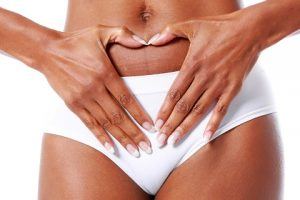Having sex again after having a baby can be daunting. There’s the obvious ouch factor for women who give birth vaginally, but did you know vaginal dryness was a common problem too? Hormonal fluctuations after pregnancy and during breastfeeding can lead to vaginal dryness, making sex sore and uncomfortable. Read on to find out more, and to hear midwife Kate’s Top Tips for intimate care during and after pregnancy.
Hormones and pregnancy

This happens as a result of the sudden drop in oestrogen and progesterone levels, which can revert back to pre-pregnancy levels within 24 hours. Oestrogen production then declines further to support production of breastmilk, and it’s this further drop that can cause vaginal dryness.
The ouch! factor
Of course, vaginal dryness isn’t the only thing to think about. Vaginal delivery can cause significant damage to the vagina. Tears to the perineum are common, and some women need an episiotomy (cut) to aid the delivery, both of which require stitches. Stitches will generally dissolve after around 10 days, but it can take a few weeks to heal completely. And even if women don’t tear or need an episiotomy, it is likely they will feel bruised and uncomfortable for some time, causing anxiety over resuming sex again.
When can I start having sex again?
There are no rules for how long it will take to have sex again after having a baby, though it’s advisable to wait until any bleeding has stopped, which can take a few weeks. The most important thing to remember is to take it easy, use lubricant, and go at your own pace. If you’re not ready, it’s OK to say no!
What do the midwives say?
We chatted to midwife Kate, who gave us some great tips on intimate care. This applies throughout pregnancy too; keeping on top of your vaginal health can make things much better in the long run.
- If you notice any offensive smelling discharge or persistent itching, talk to your Dr. or midwife. Be aware that a white discharge in pregnancy is normal but itching and smells are not. This is the same post-pregnancy too. Offensive smells can indicate infection so it’s important to get it checked out as soon as possible.
- Avoid perfume based products when washing. Warm water is just fine! (Read more about intimate washes at our blog here)
- Attend pregnancy yoga or pilates to learn more about core strength. It will help hugely with the birth, and with your recovery later.
- You’re never too young to start pelvic floor exercises! I do mine just when I’m having a chat, making dinner- any time of the day.
- Bleeding during pregnancy is not normal, so always seek medical advice if this happens at any time. If bleeding post-birth is still heavy after a few weeks, have a chat to your GP or midwife.
- If you suffer from vaginal dryness use a good, pH friendly lubricant such as Sylk. It will help enormously when you start having sex again too. Use it liberally to avoid any painful pulling, friction or tearing.
Celebrating Midwives
“Women are at the most intimate time in their lives when they’re having a baby. They let you in, and regardless of background, you get to see everything about them. It’s a privilege.”






